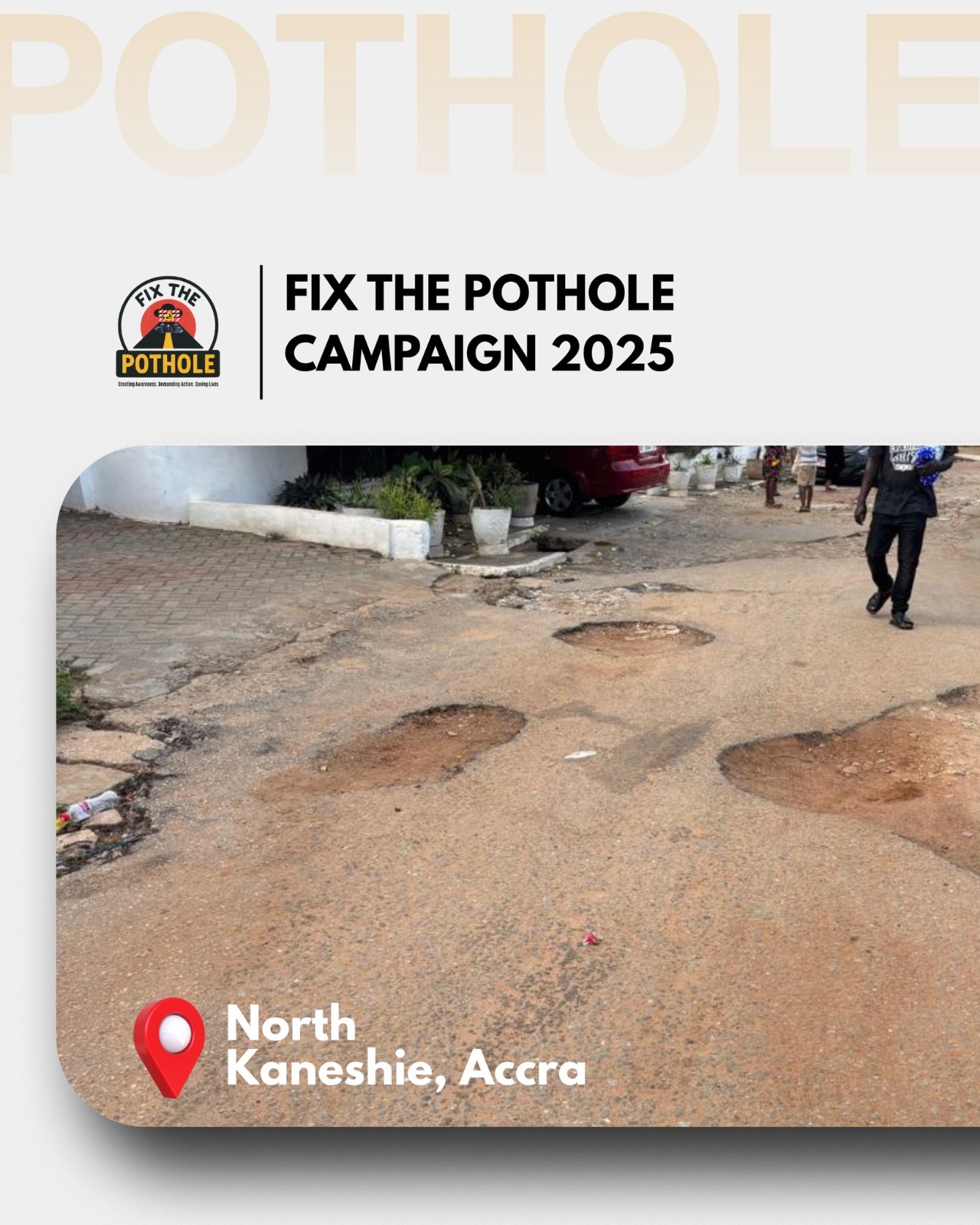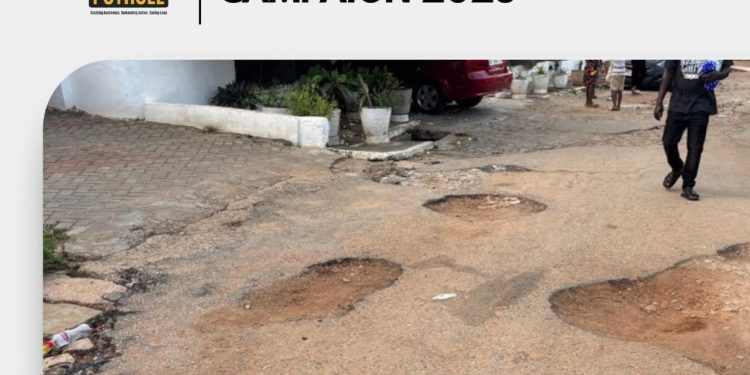
In a country where daily road travel is a necessity for millions, a quiet but deadly menace has persisted on highways, streets, and even inner-city roads: potholes.
These gaping, sometimes water-filled craters are not just an inconvenience—they are death traps. Every swerve, every sudden brake to avoid one, could result in a crash, a casualty, or even worse, a fatality.
In response to the growing toll potholes are taking on lives, livelihoods, and national productivity, a passionate group of postgraduate students from the University of Media, Arts and Communication (UNIMAC), pursuing a Master’s in Development Communication, have launched a bold nationwide campaign dubbed “Fix the Potholes.”
This social change initiative is a part of their course work—but its impact is already echoing beyond academic walls.
“We are a group of young Ghanaians who use the roads every day—some drive, others use public transport—but all of us are affected. We couldn’t just sit back anymore,” said Aku, one of the lead campaigners during a live media interaction.
“So we came together to use the skills we’ve acquired in development communication to drive a campaign that gives voice to the voiceless—those who are injured, those who have lost loved ones, those who live with disabilities and can’t speak out or protest,” she added.
Potholes have become synonymous with Ghana’s roads, from the dusty outskirts of rural communities to major highways in the capital. According to the campaign team, the situation is not just a nuisance—it is a national emergency.
“Accidents happen because drivers try to swerve potholes. In the process, they knock down pedestrians or collide with other vehicles,” said Winifred, the campaign’s content lead. “We realized these are not isolated issues. They affect everyone—trotro drivers, private car users, cyclists, pedestrians.”
Indeed, data from the National Road Safety Authority (NRSA) shows that over 2,000 lives are lost annually to road crashes in Ghana, with many incidents traced back to poor road infrastructure, including potholes.
The “Fix the Potholes” campaign is leveraging modern communication strategies rooted in community participation. The students are using their knowledge in advocacy, citizen journalism, and media strategy to mobilize the public.
“We ask people in their own communities to take pictures and videos of potholes in their areas and send them to us,” Winifred explained. “We compile them and share them on social media—on X (formerly Twitter), Facebook, and TikTok—to create national awareness and draw the attention of road authorities.”
The campaign has also received support from other media professionals, influencers, and civil society allies, who are helping to amplify the voices of affected communities.
“We have colleagues in places like the Oti Region and Takoradi who send us visual evidence. These submissions are from real people in real danger, and we are using these visuals to tell their stories,” Edmond, another team member, said.
For the students behind this campaign, gathering content hasn’t been without challenges. Winifred recounted near misses on busy roads while trying to document dangerous potholes.
“Sometimes we’re in the middle of the road, and cars are coming. Some drivers slow down to allow us to film, others don’t. It’s risky, but we believe the cause is worth it,” she said.
There are also difficulties in engaging some road users who may not understand the campaign’s intent, especially in areas where awareness is low.
Despite these challenges, the students are pushing forward with grit, fuelled by the desire to see change—not just on the roads, but in the way society treats seemingly “small issues” that, when ignored, cost lives.
“As long as there are potholes, we will keep going,” Aku said firmly. “We know how Ghana works—if you don’t keep the pressure on, you won’t see results. So this campaign will continue until we see actual roads being fixed, until we hear real commitments from authorities.”
Their strategy is not just about shaming institutions—it is about civic empowerment. Through digital storytelling and participatory communication, the students are driving a conversation that demands public accountability while inspiring citizens to take ownership of their own safety.
For Ghanaians moved by the campaign and eager to contribute, the team invites everyone to document and share their encounters with potholes.
“If you see a dangerous pothole, film it. Take a photo. Post it. Tag us @FixThePotholes on all platforms. You don’t need to wait for an accident to happen before you act,” Edmond urged.
This campaign by the UNIMAC Development Communication students is more than an academic project—it is a social movement. It is a cry for safety, a call for accountability, and a demand that Ghana’s roads stop being graveyards for the innocent.
In the words of one of the campaigners: “We are doing this for every mother who lost a child, for every breadwinner whose taxi was wrecked, and for every person who fears the roads they must travel daily.”
DISCLAIMER: The Views, Comments, Opinions, Contributions and Statements made by Readers and Contributors on this platform do not necessarily represent the views or policy of Multimedia Group Limited.
DISCLAIMER: The Views, Comments, Opinions, Contributions and Statements made by Readers and Contributors on this platform do not necessarily represent the views or policy of Multimedia Group Limited.
- President Commissions 36.5 Million Dollars Hospital In The Tain District
- You Will Not Go Free For Killing An Hard Working MP – Akufo-Addo To MP’s Killer
- I Will Lead You To Victory – Ato Forson Assures NDC Supporters
Visit Our Social Media for More



